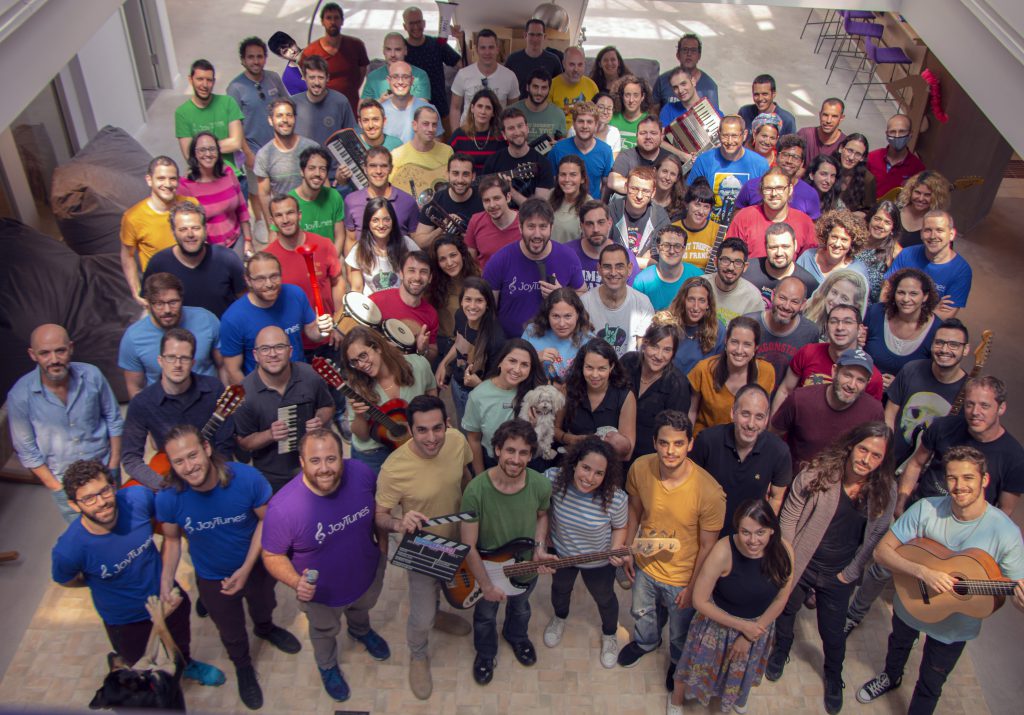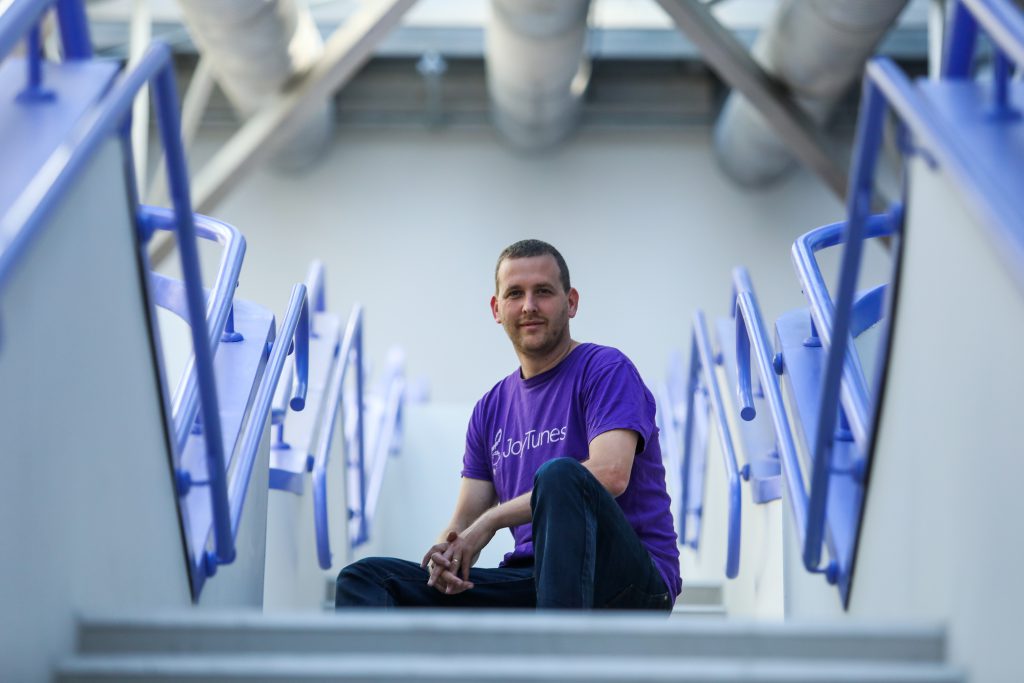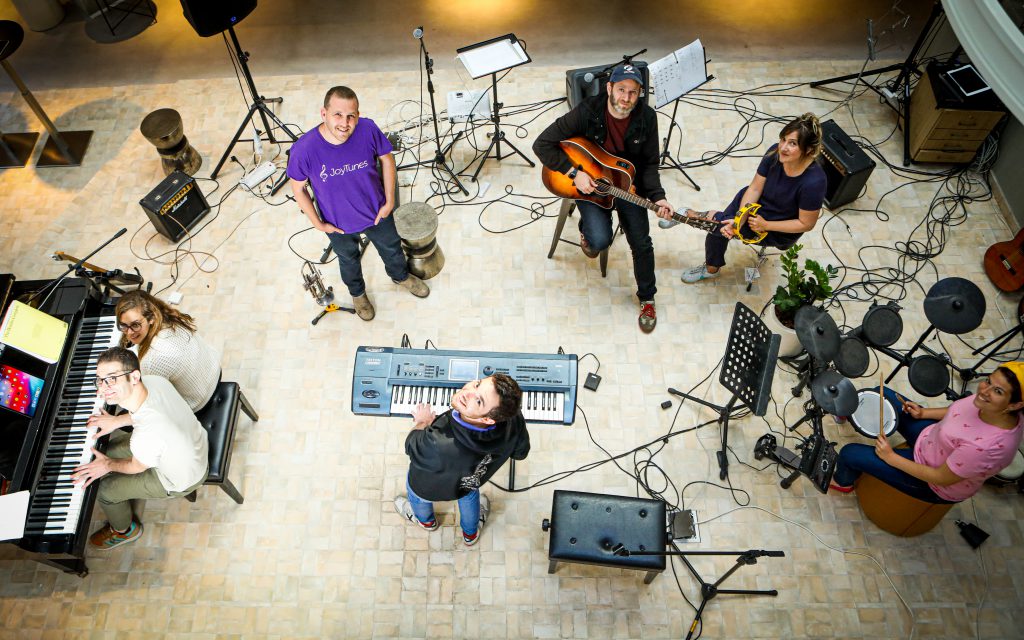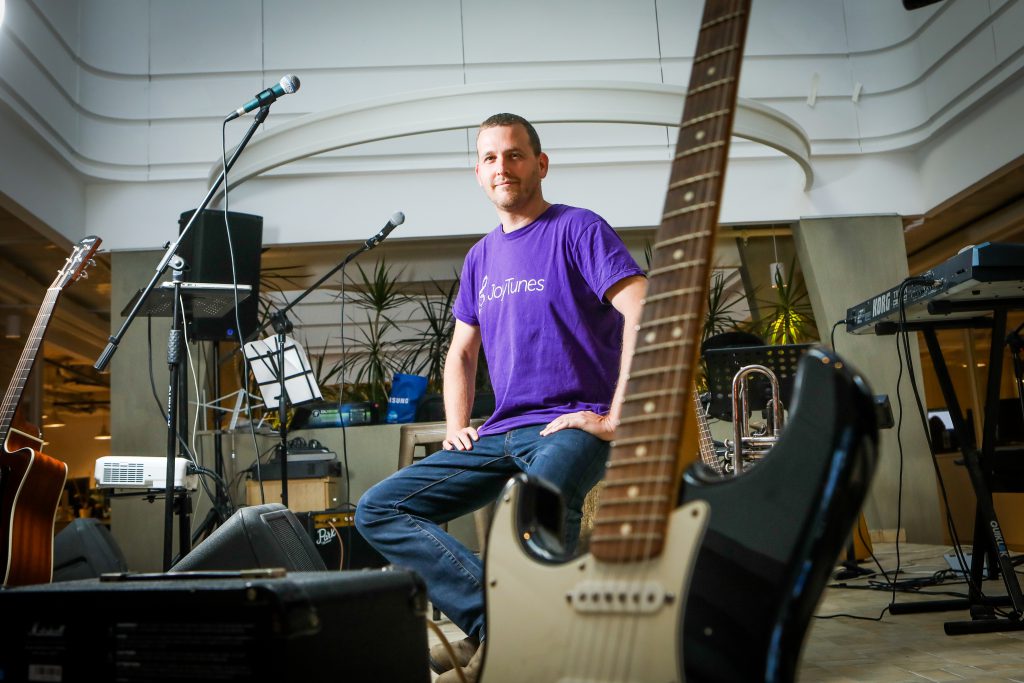Total fundraising: $43 million
Employees: 110 employees; all of them in Israel
Founders: Yuval Kaminka, Yigal Kaminka, Roey Izkovsky
Founded: 2011
Investors: Kaedan Capital, Qumra Capital, Insight Partners, Aleph, Zohar Gilon and others
One cannot miss the grand piano on the stage in the center of the office building of JoyTunes in Tel Aviv’s Montifiore neighborhood. “It’s not that we are trying to show that we are a cool place,” explains Yuval Kaminka (39), the CEO and one of the company’s three founders. “Music is a major aspect of our work.”
JoyTunes is responsible for the technology behind two applications for self-teaching of the piano and guitar for beginners, and another application designed for piano teachers. These applications make it possible to learn how to read musical notation, become familiar with chords, to adapt techniques for playing with two hands and more. Using the smartphone or tablet’s microphone, the application detects the music being played and provides immediate feedback. According to the company, its course offerings are equivalent to about two years of study with a teacher.
The company has hundreds of thousands of subscribers all over the world, and the applications are available in ten different languages. “Music is a global language that interests a wide range of ages,” says Kaminka. “The piano-learning application has adults who want to resume an old dream of music, while the guitar learning application mostly seems to draw adolescents.”
According to him, JoyTunes is the biggest company in their field in the world. Its uniqueness is in its technological strength, the holistic, family-oriented approach and the accuracy of its target audiences. “We are a product for beginner musicians. Anyone who already knows how to play well won’t use our application.”

Self Discovery
JoyTunes’ applications offered a solution for many users who were forced to stay inside as a result of the shutdowns and social isolation imposed by the coronavirus pandemic. “I decided to buy my first piano before the last lockdown,” says one of the application’s users in the UK. “I started learning on my own, mostly with the help of YouTube videos. It went well, but it was a bit boring. And then a friend told me about the application and I used it for a trial week. I fell in love with it immediately because it was a fun way to learn. I went from doing 30 minutes a day to a few hours a day. It was one of the main reasons to wake up in the morning and feel happy during those recent months.”
According to Kaminka, the pandemic gave all of us a “taste of the future,” and revealed our hidden needs, the things we want to do and how we didn’t make time for them. “The trends that developed during the pandemic period were a major boon to us: people choose to develop in a digital way at home, online education products and demand for them are growing, people expect more and the devices that we all have are very advanced — which is something that we are also benefitting from. Our guitar-learning application, which was launched right before the outbreak of the pandemic in Israel, saw significant growth, which is not directly related to COVID-19, but that the pandemic accelerated processes which were happening already in any case,” he clarifies.
This is true not just for applications like JoyTunes, but also for a long list of services like exercise applications, meditation, and even Spotify and Netflix, which rode the coronavirus wave in the last year. In the case of JoyTunes, the company’s revenue more than doubled in 2020, with the most popular subscription package being the family package which costs 120 dollars a year, giving access to five users, for both the guitar and the piano-learning applications.
In this period of uncertainty, at the start of the pandemic, the company came out with a campaign which target the countries who had been hit the hardest, including Italy and Israel. Users could register for a three-month subscription, with everyone paying what they could. The money that the company earned from this campaign was donated. “There are people who paid very little, but there were others who paid the full price and more. For the teachers we offered our application for free for half a year, because teachers were hit the hardest. We communicated to our customers that we were here to commiserate,” Kaminka explains.

Building the next Netflix
The company was established by Yuval Kaminka along with Roey Izkovsky (40). The two served together in an elite intelligence unit, and both have a Master’s degree from the Weizmann Institute: Yuval has a degree in computational neurobiology and Roey has a degree in statistics. “Roey is one of the smartest people that I have ever worked with in my life,” says Kaminka.
Each of them worked in the world of technology, but they felt that it was not fulfilling them. “I am an entrepreneur who takes stock of things, and examine where I feel that what I am doing can be meaningful, it is less interesting to me whether or not I am the boss. In the army I experienced that kind of entrepreneurship, so I know that I can be a leader of something meaningful,” says Kaminka. In 2011, the two checked out technological possibilities for start-ups. “I sent Roey three ideas, and it was clear to him at once that we have to go for the musical option.”
“The initial idea came from a well-known place. When I was a kid I learned to play music and I remember how important it is to stick to your practice. During a visit with my nephews I saw that they preferred playing computer games and didn’t want to practice their instruments. So at first the idea came from a place of making music practice more fun, and in time we realized that it was much bigger than we had thought: there are many people who want to learn, but there are also those who want to learn to play something for a special event, and those who want to jam at night.
“We felt that our product had to be out in the world, not just because it was a business opportunity. We weren’t looking to make the next big hit, and that’s not the familiar cyber model in the Israeli start-up landscape. We intend to build something different which will become very big.
“We are building an empowering service. Where can I, as an individual, or a family, spend my time? There is a lot of dead time with the family, like watching television, for instance, but when we finish two hours of using the JoyTunes app, we feel good about ourselves, it adds another dimension to life. We aren’t another company of products, but a platform for time-investment.”
For the assignment/job/task/ the two recruited Yuval’s brother — Yigal Kaminka (37). Yigal is the musical rib/ of the the trio — he is the first oboe in the Jerusalem Symphony Orchestra and other orchestras in Israel and around the world, but plays many musical instruments. He studied at the Academy of Music in Jerusalem and then at the/a Academy in Germany for seven years, where he completed a Master’s and PhD in music.

Since then the company has received some $43 million in investment/investing, in three main rounds of fundraising. Insight Partners, Aleph and Qumra Capital are [the main/primary/significant/stand out/prominent investors, alongside/along with Kaedan Capital, angel investor Zohar Gilon and others. The company currently employs 100 employees. And it seems that this is hardly a final number.
“We are building a company that will influence the world and that is very aggressive in its growth,” says Kaminka. “And that means that the milestone of becoming a unicorn is just a stage/phase of/along the way. I am not aiming for that. We are aiming to build Netflix, with all that that implies/means.
“We received acquisition offers, we are constantly getting such offers, but that’s not where we are headed at the moment. It’s not coming from a place of us wanting to be our own bosses, but rather from the place where we aren’t trying to get to an exit, we are trying to build.”
The mix of employees in the company is very different from your typical tech company. “We stand out in the local landscape,” says Kaminka. The teams are very diverse, and there is also a variety of disciplines and opinions. Out of the 100 team members — only 25 of them are developers. The rest are from different fields including, of course, musicians. “We were inspired by Spotify and Netflix at the level of the approach to their work, which emphasizes people’s abilities and extreme decentralization of responsibility,” says Kaminka. “For example, there is a staff member who can do something in our company that we had not even thought of, but we trust it will be great because he is the expert.”
And like with playing music, in business, too, a feeling of confidence plays a key role. This is another inspiration that Kaminka received from the best — “to follow your heart because you feel it is what must be done — not because it is what everyone else is doing.”





